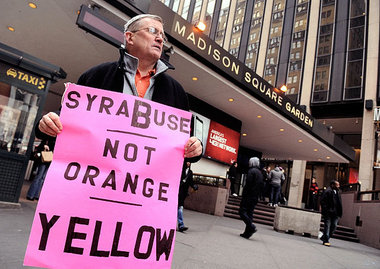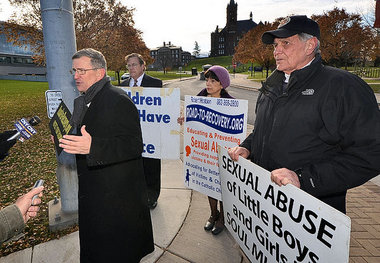Former Priest Robert Hoatson Launches Himself and His Cause into the Spotlight Amid Bernie Fine Scandal
By Emily Kulkus
Syracuse, NY -- On Feb. 23, Robert Hoatson took the Syracuse University sex abuse scandal to a new level — which is how the former Catholic priest-turned-victims advocate does business. At a panel discussion of news coverage at SU and Penn State, Hoatson made an announcement: He was counseling a new victim of sexual abuse by a head coach at SU. Fingers stopped tweeting. Heads turned to neighbors. Feet fidgeted. It was as if the audience thought: “What did he just say?” Hoatson refused to give details. Several spectators demanded some; otherwise, they said, Hoatson was casting a shadow on a campus that had already been shaken by allegations against basketball coach Bernie Fine. Such worries don’t bother Hoatson. For him, it was another chance to give a voice to an alleged victim and to bring attention on his cause — and himself. The unwavering insistence that an accused person is a pedophile is what drives Hoatson’s persistent public advocacy for victims. And the sex scandals at Syracuse and Penn State, and in the Catholic Church, have vaulted him into the media and provided a growing audience for his bold statements. Hoatson’s background as an alleged victim and a former Catholic priest make him an uncommon spokesman for the cause. While a priest in New Jersey in 2002, Hoatson began making public statements about sex abuse in the Catholic church and its schools. He began to talk publicly about the abuse he said he suffered for a dozen years at the hands of at least four religious colleagues and superiors as a Christian Brother and while studying to become a priest. Hoatson, who was ordained in 1997 at age 45, blamed the abuse for his panic and anxiety attacks as well as severe depression that included suicidal thoughts. Hoatson criticized Catholic bishops for covering up for pedophile priests while testifying at a legislative forum in Albany about a bill to help abuse victims in May 2003. Days later, the Newark diocese removed him from his post as headmaster of a school. Archdiocese officials said it was because Hoatson was having management problems and clashing with the finance committee. In late 2005 Hoatson filed a sensational $5 million federal lawsuit against the Newark, New York City and Albany dioceses and others that alleged church leaders had conspired against him because he’d become a whistleblower. A week after filing the lawsuit, the Newark diocese told Hoatson he could no longer present himself as a priest. He’s been without an assignment from the church ever since. A judge dismissed the lawsuit in 2007. Hoatson, 60, has used his freedom from the church to grow his nonprofit, Road to Recovery, which he founded in 2005. Last November, when the Vatican approved Hoatson’s request to no longer be a priest and ended his pay, Hoatson began using the Penn State and SU scandals to launch himself and his nonprofit into the national spotlight. He protested in public places at both schools and has continued to call for SU to fire head basketball coach Jim Boeheim and Chancellor Nancy Cantor. He appeared on CNN and was regularly quoted by national media covering the Fine case. He sent out a news release promoting his protest of SU at the Big East Tournament in New York City. He held fluorescent signs and passed out fliers outside Madison Square Garden slamming “SyrAbuse University” for not firing Boeheim. Hoatson continues to portray as victims two men who originally made allegations against Fine but were later discredited: Floyd David VanHooser, who mailed letters to Fine saying he lied to police, and Zach Tomaselli, who admitted doctoring emails from police and about his school attendance records, and lying to reporters. To Hoatson, the number of accusers – a total of four publicly identified — is enough to establish their credibility: “What more evidence do you need?” Hoatson said. Fine, who was fired Nov. 27 by SU after spending 36 years as Boeheim’s assistant, has not been charged and has denied all wrongdoing. Victim No. 4 In Hoatson’s campaign against abuse, he brings attention on himself. After the Syracuse panel discussion, Hoatson had an audience of assembled reporters and those following on an Internet webcast when he made his vague allegation against an unidentified former coach. News outlets covered the remark. SU immediately reported the information and police said they would investigate. SU and police aren’t saying if anything has yet come of it. But Hoatson said no one has contacted him about his Feb. 23 statement and he didn’t know if anyone had been in touch with the alleged victim. Coaches at SU who had never sexually molested anyone didn’t have anything to worry about because they were innocent, Hoatson said. At the height of media attention on the Fine case last fall, Hoatson boasted on CNN and several other news outlets that he knew of a “victim No. 4.” He was referring to VanHooser. At the time, Hoatson was talking with VanHooser’s family in Syracuse but had not met or spoken with VanHooser in person. Only later did he visit VanHooser in prison. He criticized The Post-Standard for publishing a story about VanHooser’s in-person admission to a reporter that he lied, saying journalists should understand such behavior is common for sex abuse victims. And, Hoatson said, he should’ve been quoted in the story as a victim’s expert. “I think journalists have to make a call,” he said, “and I think the call should be in favor of the child who may now be an adult sitting in front of you.”
An unusual approach Hoatson’s approach to advocacy tends to be louder and intentionally more shocking compared to other advocacy organizations and sex abuse experts. David Clohessy is the national director of SNAP, the Survivors Network of those Abused by Priests, and has worked with Hoatson on several occasions. Clohessy said most victims groups and advocates rarely accuse someone of wrongdoing without the filing of a criminal charge or civil lawsuit. Clohessy, however, defended Hoatson’s attacks on Fine and Boeheim, saying Hoatson is well-intentioned. “While it is very, very, very hard for a wrongly accused adult to repair his or her reputation, it is infinitely harder for a sodomized kid to repair his or her emotional, physical and spiritual psyche,” Clohessy said. “It would be nice to have the luxury of a fully resolved criminal process before any of us have to make any decisions.” One of the main things Hoatson does with Road to Recovery is talk with victims of sexual abuse. Hoatson has no social work license or counseling training outside of what he learned as a priest. He said he speaks to victims based on his own experience and recommends they talk with professionals as needed. Road to Recovery is supported through donations, some from sex abuse victims who have won court settlements. According to tax filings, the nonprofit’s income was $62,385 in 2009 and $97,420 in 2010. Hoatson said he runs the organization on his cell phone, website and the 2002 Toyota Corolla that was donated by a victim. He often works out of the northern New Jersey home he shares with his 85-year-old mother. For nearly six years, the church paid Hoatson about $1,500 a month, Hoatson said. That ended in November and his health coverage expires at the end of this month. The Archdiocese of Newark could not cut ties with Hoatson fast enough. Jim Goodness, a spokesman for the diocese, published a scathing news release in late 2005 about Hoatson that remains online. Goodness did not want to comment on Hoatson’s recent activity but stood behind his previous statements. In the release, Goodness calls Hoatson “a troubled individual,” who “carelessly and recklessly use(s) falsehoods to draw attention to himself.” The news release also disputes the claims Hoatson made in his 2005 lawsuit against the church. “An angry survivor” Anthony Frallicciardi, a former Syracuse restaurant owner who said he is a victim of abuse, said he thinks Hoatson exploits victims to propel his nonprofit. Frallicciardi, who was born and raised in Boston, sued the Boston Archdiocese for the sexual abuse he said he endured by a priest from age 7 to 10. Frallicciardi said he was going broke travelling between Syracuse and Boston to pursue the case. He turned to Road to Recovery for financial help. The two dispute how much money changed hands. Frallicciardi said it was $2,400. Hoatson said it was more like $7,000 or $8,000. When Frallicciardi received a court settlement in 2008, Hoatson put a lien on the money and recovered $2,400. Frallicciardi sued Hoatson in 2009 to try to get the money back. Frallicciardi eventually dropped the case, but not his resentment for Hoatson. “He’s an angry survivor himself,” Frallicciardi said. “An angry survivor has no business counseling anybody. Survivors can’t be objective.” Hoatson’s supporters say his personal experience and knowledge of the Catholic Church make him effective. Hoatson, they say, is an unpopular, under-appreciated hero — willing to say and do what few are. Sandy Smith and Marianne Barone Trent spent nearly a decade investigating rumors that Catholic priests had sexually abused children in Central New York. Both said they sometimes leaned on Hoatson for support and guidance. Smith describes Hoatson as brave and humble. “When you’re in this arena it’s not a popularity contest,” Smith said. “These abuse cases, when you speak out, you stand alone.” Barone Trent said she knows if there’s a sex abuse scandal brewing, Hoatson will be involved. “He’s walking a very hard walk,” she said. “It’s very lonely at times. He’s trying to expose a wrong and it’s not going over real well with the powers that be.” Charles Bailey, an abuse survivor and coordinator of the Central New York Chapter of SNAP, said Hoatson means well. “He may be a little more strong or vocal than the rest of us, but I think it goes back to his love of the victims and trying to right the wrong,” Bailey said. God’s instrument Those who know Hoatson do not doubt his dedication — instead it’s the opposite. Many said sometimes a person’s blinding passion for righting a wrong can blur the message. Allison Young, the director of sexual abuse services at Elmcrest Children’s Center in Syracuse, was a speaker on the same February panel with Hoatson. She was surprised by Hoatson’s statement about the coach and did not immediately understand his intention. “I’m not really sure what his goal was, but I think again that now we’re talking about his statement,” she said, “it takes away from the goal of what we want to happen, and that is education, understanding and support of victims in our community.” Hoatson said he’s worked with more than 1,000 victims since founding Road to Recovery. During the next few months he said he has to figure out how to draw a salary from the nonprofit to which he’s dedicated his life. And if standing on a sidewalk wearing a hot pink sandwich board with the words “sexual abuse of little boys and girls is soul murder” — one of his phrases to turn heads and open minds — then so be it. “If bringing attention to myself brings attention to the people I’m working with, then I must bring attention to myself because I consider myself God’s instrument to right wrongs and help people heal,” he said. “I’m the public face of many people right now who can’t be public.” Contact Emily Kulkus at ekulkus@syracuse.com or 470-2184.
|
.
Any original material on these pages is copyright © BishopAccountability.org 2004. Reproduce freely with attribution.

